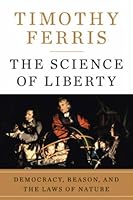
## Metadata
- Author: [[Timothy Ferris]]
- Full Title: The Science of Liberty
- Category: #books
## Highlights
- The spectacular failure of totalitarian science spotlighted the futility of attempting to treat science as a tool that could be divorced from its ethical imperatives. It is often said that science is ethically neutral—that it shows how things are, not how they ought to be—but there is less to this claim than meets the eye. Applied science has placed enormous power in human hands, and power can be used for good or ill, but to exploit that power without accommodating the scientific culture that produced it, as illiberal states have done, is to kill the goose that lays the golden eggs. The more closely science is examined, the more evident it becomes that science has an ethos and perhaps an ethics. The mathematician and polymath Jacob Bronowski was especially perceptive about this. “The society of scientists,” he wrote, “is simple because it has a directing purpose: to explore the truth. ([Location 192](https://readwise.io/to_kindle?action=open&asin=B0035D9URS&location=192))
- Nevertheless, it has to solve the problem of every society, which is to find a compromise between man and men. It must encourage the single scientist to be independent, and the body of scientists to be tolerant. From these basic conditions, which form the prime values, there follows step by step a range of values: dissent, freedom of thought and speech, justice, honor, human dignity and self-respect. ([Location 198](https://readwise.io/to_kindle?action=open&asin=B0035D9URS&location=198))
- Men have asked for freedom, justice and respect precisely as the scientific spirit has spread among them. The dilemma of today is not that the human values cannot control a mechanical science. It is the other way about: The scientific spirit is more human than the machinery of governments. ([Location 204](https://readwise.io/to_kindle?action=open&asin=B0035D9URS&location=204))
- It helps to consider that whereas prior systems dealt in claims of certitude, such as philosophers’ allegedly airtight reasoning and monarchs’ god-given right to rule, science and democracy are steeped in doubt. Both start with tentative ideas, go through agonies of experimentation, and arrive at merely probabilistic conclusions that remain vulnerable to disproof. ([Location 279](https://readwise.io/to_kindle?action=open&asin=B0035D9URS&location=279))
- the politician who claims that his administration is perfect is a tyrant. ([Location 297](https://readwise.io/to_kindle?action=open&asin=B0035D9URS&location=297))
- Winston Churchill’s famous remark, democracy and science are the worst systems of governance and inquiry, except for all the others. ([Location 298](https://readwise.io/to_kindle?action=open&asin=B0035D9URS&location=298))
- But science must comprehend before it can control—as Francis Bacon wrote, “Nature is only subdued by submission”—and ([Location 307](https://readwise.io/to_kindle?action=open&asin=B0035D9URS&location=307))
- The spirit of liberty is the spirit which is not too sure that it is right. —JUDGE LEARNED HAND, 1944 ([Location 313](https://readwise.io/to_kindle?action=open&asin=B0035D9URS&location=313))
- Liberalism (from the Latin for “freedom”) is based on what John Stuart Mill in 1859 called one very simple principle…. that the sole end for which mankind are warranted, individually or collectively, in interfering with the liberty of action of any of their number, is self-protection. That the only purpose for which power can be rightfully exercised over any member of a civilized community, against his will, is to prevent harm to others. ([Location 322](https://readwise.io/to_kindle?action=open&asin=B0035D9URS&location=322))
- Note: isn't this also libertarianism?
- The word liberal entered the English language through education, where it signaled a shift from the narrow preparation of students for the vocations to which their social status had predestined them (usually law or the priesthood) to a “liberal sciences” (later called liberal arts) approach aimed at arming students with the tools needed to thrive in an unpredictable world. Andrew Abbott of the University of Chicago used to tell incoming freshmen, “There are no aims of education. The aim is education.” ([Location 331](https://readwise.io/to_kindle?action=open&asin=B0035D9URS&location=331))
- Liberalism’s acceptance of unpredictable change distinguishes it from conservatism, which concentrates on the lessons of the past, and from progressivism, which plans for a future about which it knows rather less than it sometimes claims. ([Location 336](https://readwise.io/to_kindle?action=open&asin=B0035D9URS&location=336))
- The tension between liberals and progressives—between those who stress liberty and those who stress equality—has long persisted; as Reinhold Niebuhr observed in 1943, “Whether democracy should be defined primarily in terms of liberty or of equality is a source of unending debate.” ([Location 414](https://readwise.io/to_kindle?action=open&asin=B0035D9URS&location=414))
- Liberalism stands out among political philosophies in its readiness to embrace change. Liberals do not pretend to know what the future will bring, and so are skeptical about planning. They stress the importance of individual creativity, noting that humans are profoundly ignorant and so must be free to keep learning. As the liberal economist Friedrich Hayek declared, “All institutions of freedom are adaptations to this fundamental fact of ignorance, adapted to deal with chances and probabilities, not certainty. Certainty we cannot achieve in human affairs.” ([Location 496](https://readwise.io/to_kindle?action=open&asin=B0035D9URS&location=496))
- Liberalism’s claim that all humans have equal rights is therefore mirrored in the universal validity of scientific facts. “Far from being relative truths, scientific results tend to make everyone’s truth property the same across cultures,” noted the American philosopher Robert Nozick. “In this sense, science unifies humanity.” ([Location 505](https://readwise.io/to_kindle?action=open&asin=B0035D9URS&location=505))
- “In an advancing society,” noted the mathematician H. B. Phillips, “any restriction on liberty reduces the number of things tried and so reduces the rate of progress. In such a society freedom of action is granted to the individual, not because it gives him greater satisfaction but because if allowed to go his own way he will on the average serve the rest of us better than under any orders we know how to give.” ([Location 519](https://readwise.io/to_kindle?action=open&asin=B0035D9URS&location=519))